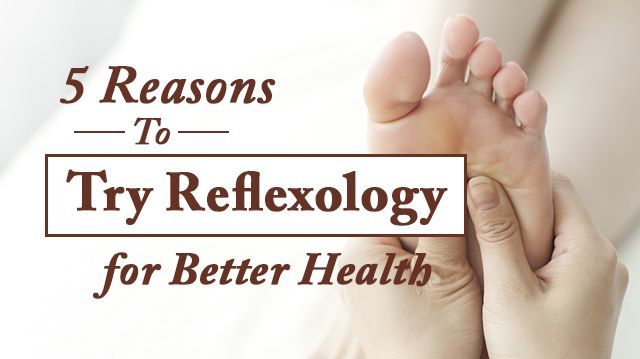
I’m not one to go to the doctor often — I mean, if I have to, I will. Like that time I needed surgery for my sleep apnea. As I’ve grown older, I’ve focused not only on alternative medicine, but greater preventive measures.
I always say to my husband, we need to be proactive, not reactive. A friend of mine got me into reflexology, something I knew nothing about before my first encounter. Whether you’d like to address a pre-existing condition or simply promote positive health, you should definitely try this nonintrusive health therapy.
What is reflexology?
Reflexology is basically massage techniques that help address illness and reduce overall tension. How it differs from any typical massage is that reflexology focuses on various reflex points on the hands, feet and head. The theory is, these pressure points correspond to all other internal organs and systems.
In fact, since focusing more on reflexology and alternative methods, my husband no longer needs to use an inhaler for his asthma. He used to go through at least one inhaler a month; however, he hasn’t filled his prescription in over a year. Mind you, he did address suspected triggers as well.
It’s important to note that reflexology does not cure conditions. It does, however, complement other treatments, helping individuals reduce the frequency and severity of symptoms. Sounds pretty good, right? There’s a reason why reflexology is growing in popularity across North America and Europe, and here’s how you can benefit.
Five reasons to try reflexology
If you think you would personally benefit from reflexology or you’re still researching its potential benefits, here are five reasons to try this form of therapy. Don’t knock it until you try it.
Reason #1: It has the history to back it up
Reflexology is an ancient practice, so it’s anything but new and trendy. This technique may date back as far as 2330 BC, based on a pictograph recorded in an Egyptian tomb. From Buddhists to Chinese emperors, internal medicine and the use of “foot methods” have been utilized for centuries.
In 1917 in the United States, William H. Fitzgerald, MD, also known as the father of reflexology, found that various pressure points relieved pain during minor surgeries. From there, detailed maps were created, describing these reflex points and their potential benefits. Today, we continue to utilize the benefits of reflexology, based on a range of clinical studies.
Related: The Ancient Art of Reflexology and What You Can Do Yourself
Reason #2: Improves circulation
More often than not, poor circulation indicates other underlying health conditions, including diabetes and hypertension. The longer you suffer from bad circulation, the more likely it is you’ll experience health complications. As hands and feet are massaged, for instance, reflexology can improve blood flow to vital organs.
As blood flow improves, various organs and systems receive greater concentrations of oxygen and nutrition-rich blood. In turn, this can help nourish tissues and enhance healing. Within one study, published in the Journal of Korean Academy of Nursing, it was found that self-foot reflexology significantly improved circulation among middle-aged women.
Reason #3: Boosts immune function
For those who are confined to a bed, for instance, reflexology not only helps stimulate blood flow, but also lymph fluid — helping the body naturally clean tissue and boost overall immunity. This will benefit anyone who is aiming to improve their health.
As you massage certain reflexology points, lymph fluid carries metabolic waste away from vital organs and muscles, resulting in improved function and lower overall blood pressure. Remember, prevention is ALWAYS better than cure — supporting your immune system allows you to naturally protect yourself.
Reason #4: Relieves stress
Reflexology is often used to address symptoms of depression and anxiety, helping individuals experience enhanced relaxation. The summary of one study, published in Complementary Therapies in Clinical Practice, stated, “Reflexology reduced ‘state’ anxiety and cardiovascular activity within healthy individuals, consistent with stress-reduction. Considering the connection between stress/anxiety and well being, the effects of reflexology may have beneficial outcomes for patients.”
By relaxing the body through reflexology, you are then more capable of dealing with the stresses of daily life. Within one large review, it was reported that reflexology may create a relaxation effect — potentially lowering blood pressure, reducing anxiety, and even decreasing pain levels.
Reason #5: Increases energy
Chronic fatigue is a major issue throughout the Western world, but luckily, there are plenty of natural ways to combat this condition, including reflexology. The whole point of reflexology is to promote balance, and in turn, enhanced healing is experienced, along with optimal energy. It’s said that using this therapy can help target “blockages” that hinder the natural flow of energy.
Depending on your personal situation, you may need to stimulate varying points. For some, stimulating the thyroid reflexology point can help combat fatigue, whereas others address the kidneys. In Traditional Chinese Medicine (TCM), the kidneys are known to be the “root of life” — acting as a reservoir for your energy.
Become familiar with various reflexology points as a way to help improve anything from digestion to mood. Open your mind and don’t be shy to try more traditional healing techniques. Begin testing out this ancient healing “force” today — you might find it’s what you’ve needed all along.
—Krista Hillis
Krista Hillis is passionate about nutrition, mental health, and sustainable practices. She has her Bachelors in Psychology and Neuroscience and is still active in her research. Studying both the body and mind, she focuses on natural health and balance. Krista enjoys writing based on her ability to inspire others and increase overall awareness.
Sources:
http://www.ctcpjournal.com/article/S1744-3881(06)00090-9/abstract
http://www.takingcharge.csh.umn.edu/explore-healing-practices/reflexology
http://www.ncbi.nlm.nih.gov/pubmed/19901496
http://www.ncbi.nlm.nih.gov/pubmed/19161949

